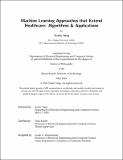Machine Learning Approaches that Extend Healthcare: Algorithms & Applications
Author(s)
Yang, Yuzhe
DownloadThesis PDF (28.51Mb)
Advisor
Katabi, Dina
Terms of use
Metadata
Show full item recordAbstract
Modern clinical systems frequently exhibit sporadic patient visits, delayed diagnoses, and unequal care distribution among diverse populations. Often, diseases aren’t identified until they reach advanced stages. The scarcity of specialists and disparities in healthcare access further complicate the long-term monitoring, timely intervention, and unbiased assessments. This thesis addresses the above challenges by developing artificial intelligence (AI) and machine learning (ML) algorithms and building practical systems that use these algorithms to solve key problems in healthcare and medicine.
Specifically, on the algorithms front, the thesis introduces principled ML approaches to achieve fair, unbiased, and generalizable AI models, addressing core challenges in real-world medical data which encompass four main axes:
• Label Scarcity: The thesis presents a novel self-supervised learning scheme that learns periodic and frequency information in data without labels, enabling representation learning for periodic tasks like vital signs estimation with minimal labeling efforts.
• Data Imbalance: The thesis develops new ML algorithms to address data imbalance in regression, filling the gap in techniques for practical imbalanced regression problems.
• Domain Generalization: The thesis presents theoretically grounded learning methods that ensure generalization across imbalanced domains and unseen environments.
• Subpopulation Shifts: The thesis studies learning in the presence of underrepresented subgroups, providing actionable insights for model deployment in real-world settings.
On the applications front, the thesis develops new AI-driven biomarkers and systems for human disease and medicine leveraging the proposed algorithms, enabling discovery and advancing delivery and equity in healthcare:
• Early Diagnosis Biomarker for Parkinson’s: The thesis presents an AI-based biomarker for Parkinson’s disease that enables early detection years before standard clinical diagnosis, as well as longitudinal progression tracking using nocturnal breathing signals.
• In-Home Touchless Monitoring of Sleep Posture: The thesis designs novel AI systems for continuous and contactless sleep posture monitoring overnight in the user’s own home using wireless signals.
• Equitable Medical AI Deployments In The Wild: The thesis establishes best practices for medical imaging AI models that maintain their performance and fairness in deployments beyond their initial training contexts, across diverse populations and unseen sites.
Date issued
2024-05Department
Massachusetts Institute of Technology. Department of Electrical Engineering and Computer SciencePublisher
Massachusetts Institute of Technology